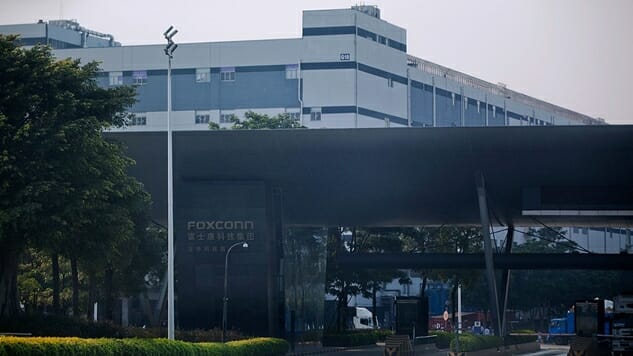Remembering Xu Lizhi, the Poet and Foxconn Worker Who Jumped to His Death
Photo by Daniel Berehulak/Getty
I imagine it like this:
Xu Lizhi left his room—the linoleumed sliver where he had spent nearly three years now, off and on. Its fluorescent lights beating down their sterile sunlight on pages of poetry. Despairing but determined, he took the elevator to the ground floor, pushing through the wicker gate “like a dead man/ Slowly pushing open the lid of a coffin,” as he once wrote. He crossed the courtyard, some of Foxconn’s million-strong work force lingering under sparse trees, smoking or talking. Maybe even laughing. He crossed to a different building and took the elevator to the 17th floor.
There, 24 years of life toed the window ledge. What of it? Life in an increasingly stratified China, where the rail-thin third son of a farmer had little choice but to set out to the city with the thousands of other migrant workers. What of his talent? Crushed by dullness and personal disappointments, it must have seemed hardly to matter. He must have felt that he’d already glimpsed the future—wages every tenth day of the month in exchange for every ounce of vitality he ever had. For young workers like Xu, “Industry captures their tears before they have a chance to fall.”
And so, he jumped.
Xu Lizhi the Worker-Poet
Xu’s story might have been a footnote—another obscure name and life—among those that had jumped before him. He might’ve been all but forgotten to the more privileged of us—a passing concern for migrant workers rapidly displaced by the desire for the next iPhone. Xu might have been simply a number, a moment’s guilt, a fleeting criticism of capitalism.
But Xu was a poet.
He left behind pages of writing that tell the haunting story of a life that otherwise might have been forgotten. His words pierced through borders, languages and norms when they were translated by friends of the Nao Project. Xu had created a testament to misery so complete—and so damning—that it resonated. Today, closing in on three years since Xu jumped—we must not shake off his words when we close a tab on a screen or turn the page of a newspaper.
Yet, it almost seems necessary that we forget. If we remembered, how could we continue to drive the market for cheap electronics? And is it really so bad to want for things—for computers and cameras and the next, greatest smartphone? These are the material trappings of modern life, and they are hard to avoid. Yet, as Foxconn reported a 30% growth in net profit at the end of the fourth quarter—we have to wonder: Who is suffering as a result?
Rampant Suicides
Foxconn is the largest contract electronics manufacturer in the world. The Taiwanese conglomerate creates components for motherboards, MP3 players, cameras, cell phones, and more. A list of their clients is a literal who’s who of the consumer electronics economy—names like Microsoft, Nokia, IBM, Dell, Sony, Amazon and Apple. Fueled by contracts with major players such as these, Foxconn consistently posts hundreds of billions of dollars in revenue, and is the single largest employer in all of China. They have several factories spread throughout the eastern reaches of the country, and are planning to build factories in the poorer western provinces.
-

-

-

-

-

-

-

-

-

-

-

-

-

-

-

-

-

-

-

-

-

-

-

-

-

-

-

-

-

-

-

-

-

-

-

-

-

-

-

-








































